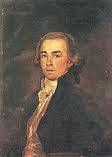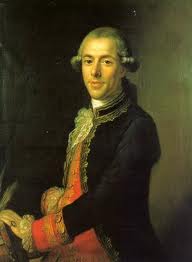Enlightenment poetry
Spanish enlightenment poetry wasn't the most popular genre during the Age of Enlightenment compared with other centuries, and many writers and scholars neglected the genre. However there there were still a number of writers who cultivated it. Mostly the best writers were brought together by groups that met to discuss different topics, like the reforms taking place in Spain, the new ideals introduced mainly by the French and the English, and the evolution of the different literary genres. The most important groups or schools (as they were sometimes called) of the time, were the ones in the cities of Salamanca, Madrid and Seville.
Spanish Poetry School in Salamanca

The main writer of Spanish enlightenment poetry in the School of Salamanca was Juan Meléndez Valdés, who is considered to be one of the best poets of the 18th century. He was born in Badajoz in 1745 and was a professor in Salamanca, were he became friends with Cadalso and Jovellanos, two of the main writers of the Enlightenment prose genre. He worked as a jurist and lived in Zaragoza, Valladolid and Madrid, were he worked as supreme prosecutor. After Jovellanos was exiled to Mallorca, and as a result of his friendship with the essayist, Valdés was exiled to Medina del Campo, then later to Zamora and last of all to Salamanca. He was an afrancesado during the Independence War and he managed to escape execution, but after the French lost he was forced to go into exile once again. He moved to France, and in died in Montpellier in 1817.
There are two stages to the works of Valdés:
- In the first stage he was influenced by the Baroque poet Cadalso, and he wrote mainly love poems with a pastoral topic. The main work from this stage of his writing is 'Batilo'.
- After the death of Cadalso, Valdés moved closer to Jovellanos, who convinced him that pastoral poetry wasn't entirely adequate for a professor. His later works are much deeper and closer to the work done by the essayists, and he expresses his thoughts in politics, economics, social inequalities...
At the beginning, Juan Meléndez Valdés' writing style was more traditional and artificial, but with the passing of time it became more refined and precise. He also believed that his high register of writing was part of this, saying that the language he used was fit for the great subjects he was writing about.
Spanish Poetry Group in Madrid
The new ideas brought by the 18th century were readily accepted in the court and among the bourgeois media in Madrid, and there were many private initiatives that had a great influence in Spanish enlightenment poetry and literature, like the "Fonda de San Sebastián", which was founded by Nicolás Fernández de Moratín and his son Leandro, together with Cadalso and Jovellanos.
Among the writers of this Madrid group there were two who wrote fables, with the aim of promoting values and correcting society's defects. A fable is a short fictional story, in prose or verse, that features animals, mythical creatures, plants, inanimate objects, or forces of nature which are anthropomorphized (given human qualities). They normally illustrate a moral lesson, which may be expressed explicitly at the end.

These two writers were:
- Tomás de Iriarte: His first works were comedies with a heavy social critique, but his better works are the 76 fables found in "Fábulas literarias", where he expresses the neoclassical ideals through animals.
- Félix María Samaniego: He studied in France and adopted the encyclopedic ideals of the time. His most important work is "Fábulas Morales"
Spanish Poetry School in Seville
Seville also had a poetic tradition. The "Academia de las Buenas Letras" was founded in 1751, to promote the literary activity. The arrival of Pablo Olavide also meant an impulse in the Spanish enlightenment poetry, culture and arts in Seville. The poems were normally more elaborate and ornate, due to the influence of José Cadalso and Meléndez, as well as Fernando de Herrera. Some of the writers of the school of Seville wrote patriotic poems inciting the Spanish to fight for their freedom and against the French who had invaded Spain. The majority of these writers ended up in exile.

